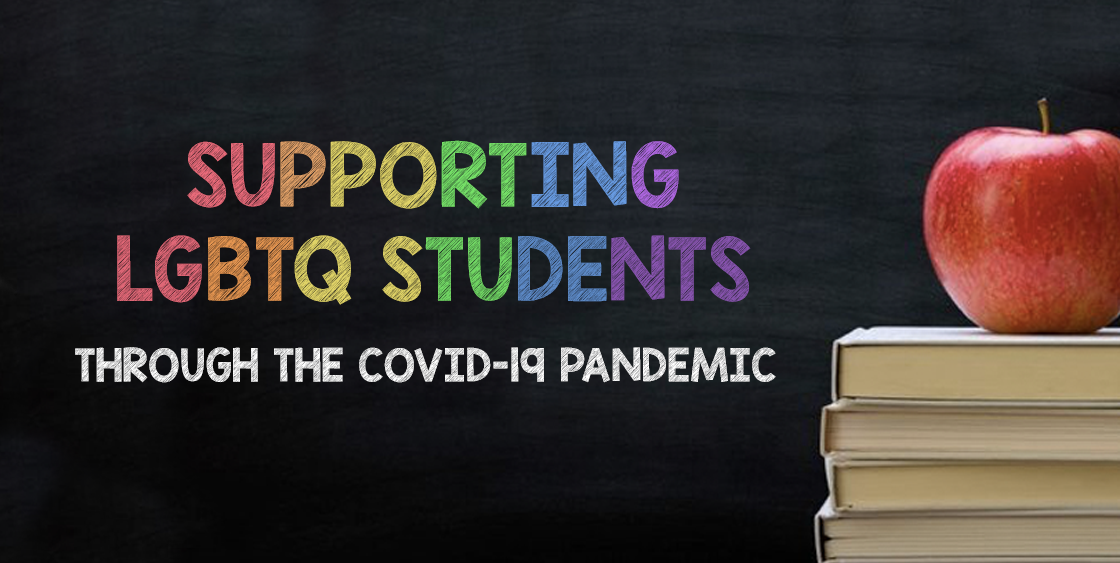Up until last week, as the Supportive Schools Coordinator for the Campaign for Southern Equality, I was driving around to schools doing faculty training, meeting with administrators, and visiting student groups. Young people are coming out as LGBTQIA+ in numbers never seen before in history, and many schools and districts are scrambling to catch up – developing new policies, learning best practices, and fostering cultural competence among faculty.

And then the COVID-19 pandemic hit, and now, schools are rapidly trying to figure out how to create effective online learning systems, ensure that all students have Internet access, and provide food security. Below are a few of the recommendations we’ve been hearing about how to make sure these new systems are safe and supportive for LGBTQIA+ students as well.
Usernames and Privacy
Many online education platforms, email systems, discussion forums, online testing sites and chat rooms automatically generate a student’s username from the school’s database. If your school’s student data system only contains legal names, which may be different from the name a transgender student uses every day at school, this can result in a violation of their privacy (and a violation of the student’s rights under the Federal Education Rights and Privacy Act).
- Make sure, whenever possible, that email addresses and usernames are set up to reflect the affirmed names of transgender students.
- If a student has been publicly ‘deadnamed’ (had their birth name revealed), recognize that this can create anxiety, dysphoria, and a very real concern for safety. A counselor or administrator should be proactive in reaching out to the student or family to acknowledge the situation, apologize and offer support.
- If you live in North Carolina, consider signing on to this request to revise PowerSchool, the state’s student data system, to protect the safety and confidentiality of trans students.
Safety, Harassment, and Bullying
Parts of the virtual world can be extremely hostile and unsafe for LGBTQIA+ young people. Schools should set up and monitor online spaces to be safe for all students, just as they do their hallways and classrooms.
- Encourage faculty to monitor all school-sponsored online forums and discussion groups, and immediately address slights, slurs, microaggressions, ‘jokes,’ and other forms of online harassment and bullying.
- Establish and monitor anonymous reporting systems for online incidents. Make sure that they are set up to accept images, like screen captures, from a variety of devices.
- Have a response plan in place before an incident occurs, and communicate it to all staff and faculty. In most cases, a restorative rather than a punitive strategy will address the issue more effectively.
- Don’t place the targeted student or students in the focus of the response; it’s not their problem. Also, be aware that bullying may shift off of the school platform and onto social media, away from the teacher’s oversight.
- Encourage parents and guardians to step up their monitoring of their children’s social media and online activities.
Online Support and Counseling
The virtual world can also be a valuable source of information and support for LGBTQIA+ students, particularly those in rural or politically conservative areas, who may have felt isolated even before the COVID-19 pandemic.
- Encourage the students or faculty who run the GSA, Pride Club or other student organization to set up a confidential virtual space for socializing or peer support.
- Make school counselors available by phone, chat or text. This is particularly important for students who live in a hostile or unaccepting home environment.
- If your school is setting up new ‘virtual clubs’ or online spaces, make sure that an LGBTQIA+ affirming group is one of the options.
Course Content and Curricula
At-home education opens a lot of doors for self-directed learning, for both individuals and small groups.
- Encourage students doing reading, writing or research projects to explore LGBTQIA+ historical figures, authors, characters, artists, issues and social movements. This can be a great opportunity for teachers to broaden their own horizons.
- Visit online resources like GLSEN and Teaching Tolerance for ideas, activities and course content that incorporates a wide range of perspectives and identities.
What are your ideas and recommendations? Email us at [email protected].

